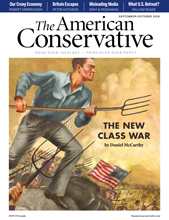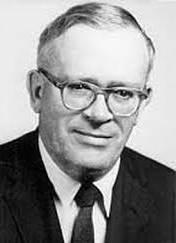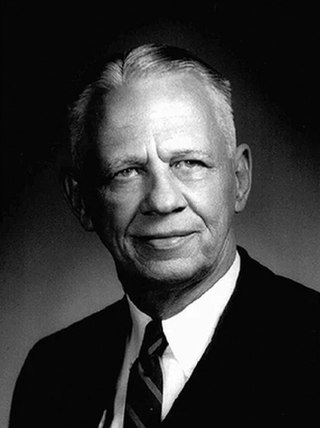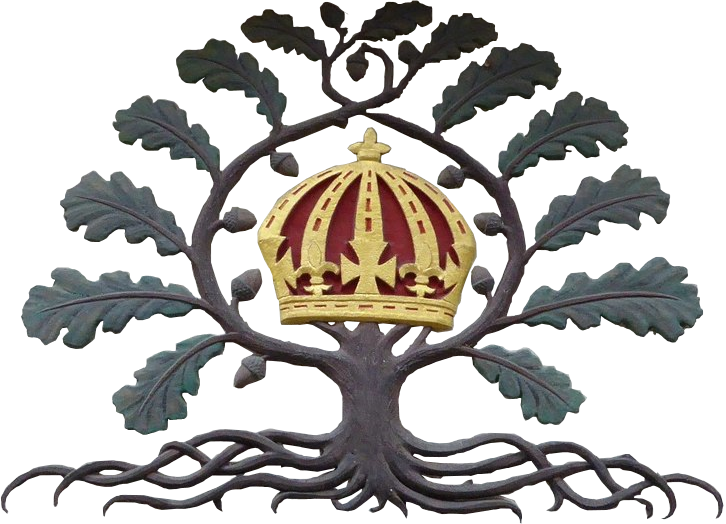
National Review is an American semi-monthly conservative editorial magazine, focusing on news and commentary pieces on political, social, and cultural affairs. The magazine was founded by the author William F. Buckley Jr. in 1955. Its editor-in-chief is Rich Lowry, while the editor is Ramesh Ponnuru.
Paleoconservatism is a political philosophy and variety of conservatism in the United States stressing American nationalism, Christian ethics, regionalism, and traditionalist conservatism. Paleoconservatism's concerns overlap with those of the Old Right that opposed the New Deal in the 1930s and 1940s as well as with paleolibertarianism and right-wing populism.

The American Conservative (TAC) is a magazine published by the American Ideas Institute which was founded in 2002. Originally published twice a month, it was reduced to monthly publication in August 2009, and since February 2013, it has been bi-monthly.

Richard Malcolm Weaver, Jr was an American scholar who taught English at the University of Chicago. He is primarily known as an intellectual historian, political philosopher, and a mid-20th century conservative and as an authority on modern rhetoric. Weaver was briefly a socialist during his youth, a lapsed leftist intellectual, a teacher of composition, a Platonist philosopher, cultural critic, and a theorist of human nature and society.

Russell Amos Kirk was an American political theorist, moralist, historian, social critic, and literary critic, known for his influence on 20th-century American conservatism. His 1953 book The Conservative Mind gave shape to the postwar conservative movement in the U.S. It traced the development of conservative thought in the Anglo-American tradition, giving special importance to the ideas of Edmund Burke. Kirk was considered the chief proponent of traditionalist conservatism. He was also an accomplished author of Gothic and ghost story fiction.

Frank Straus Meyer was an American philosopher and political activist best known for his theory of "fusionism" – a political philosophy that unites elements of libertarianism and traditionalism into a philosophical synthesis which is posited as the definition of modern American conservatism. Meyer's philosophy was presented in two books, primarily In Defense of Freedom: A Conservative Credo (1962) and also in a collection of his essays, The Conservative Mainstream (1969). Fusionism has been summed up by E. J. Dionne, Jr. as "utilizing libertarian means in a conservative society for traditionalist ends."
Conservatism in the United States is a political and social philosophy whose historical characterization prioritized American traditions, conservatives ideologies, republicanism, and limited federal governmental power in relation to U.S. states, referred to more simply as limited government and states' rights. Conservative and Christian media organizations along with American conservative figures are influential, and American conservatism is one of the majority political ideologies within the Republican Party.

Peter Robert Edwin Viereck was an American poet and professor of history at Mount Holyoke College. He won the Pulitzer Prize for Poetry in 1949 for the collection Terror and Decorum. In 1955 he was a Fulbright Scholar at the University of Florence.

Willmoore Kendall was an American conservative writer and a professor of political philosophy.
Roots of American Order is a book written by Russell Kirk, originally published in 1974. The book is now published by the Intercollegiate Studies Institute.
Neoconservatism and paleoconservatism are two major branches of the American conservative political movement. Representatives of each faction often argue that the other does not represent true conservatism. Disputed issues include immigration, trade, the United States Constitution, taxation, budget, business, the Federal Reserve, drug policy, foreign aid and the foreign policy of the United States.
In American politics, fusionism is the philosophical and political combination or "fusion" of traditionalist and social conservatism with political and economic right-libertarianism. The philosophy is most closely associated with Frank Meyer.

Traditionalist conservatism, often known as classical conservatism, is a political and social philosophy that emphasizes the importance of transcendent moral principles, allegedly manifested through certain natural laws to which society should adhere prudently. Traditionalist conservatism is based on Aristotle's and Edmund Burke's political views. Traditionalists value social ties and the preservation of ancestral institutions above what they see as excessive individualism.
Movement conservatism is a term used by political analysts to describe conservatives in the United States since the mid-20th century and the New Right. According to George H. Nash (2009) the movement comprises a coalition of five distinct impulses. From the mid-1930s to the 1960s, libertarians, traditionalists, and anti-communists made up this coalition, with the goal of fighting the liberals' New Deal. In the 1970s, two more impulses were added with the addition of neoconservatives and the religious right.
The Russell Kirk Center for Cultural Renewal is a nonprofit educational organization based in Mecosta, Michigan. It was founded in order to continue the legacy of Dr. Russell Kirk, an American political theorist, historian, social critic, literary critic, and fiction author. The Center is known for promoting traditionalist conservatism and regularly publishing Studies in Burke and His Time and The University Bookman, the oldest conservative book review in the United States.
Mark C. Henrie is President of the Arthur N. Rupe Foundation. He is the former Chief Academic Officer and former Senior Vice-President of the Intercollegiate Studies Institute. He was the editor of the Intercollegiate Review and senior editor of Modern Age.
George H. Nash is an American historian and interpreter of American conservatism. He is a biographer of Herbert Hoover. He is best known for The Conservative Intellectual Movement in America Since 1945, which first appeared in 1976 and has been twice revised and expanded.

The Intercollegiate Studies Institute (ISI) is a nonprofit educational organization that promotes conservative thought on college campuses.
Traditionalist conservatism in the United States is a political, social philosophy and variant of conservatism based on the philosophy and writings of Aristotle and Edmund Burke.
The Imaginative Conservative (TIC) is an online traditionalist conservative journal published in the United States, founded in 2010.









